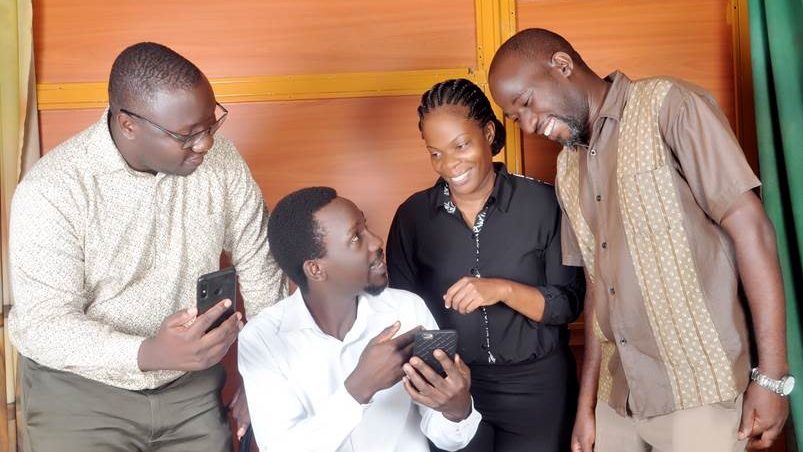
Mbarara team develops app to detect and stop sexual assault
At a recent gender workshop in Mbarara, Uganda, Femi Nzegwu interviewed creators of a new mobile app designed to detect and prevent sexual assault on university campuses and beyond.
There are many gender-based inequities and challenges in research and higher education around the world. In Uganda, INASP and Ugandan National Council for Science and Technology (UNCST) have partnered to catalyse the launch of a new Gender Alliance to address gender barriers within its institutions and be responsive to the specific and holistic needs of both women and men researchers in Uganda.
Over the past year, as part of the Alliance, workshops have been held in four regions of Uganda and some great stories and learning are already emerging, as I shared in my last post. One particularly interesting case was shared at the meeting in western Uganda.
Sexual harassment on and off university campuses is not a new phenomenon across the world. It is one of the most traumatising and debilitating experiences that could ever impact anyone’s life. For a young person, it could terminate their dreams and aspirations – literally and/or psychologically. At Mbarara University of Science and Technology in Uganda, four members of staff and their students decided not only to speak out about the devastating impact of sexual harassment and gender-based violence (GBV) on their campus but to “walk their talk” and do something about this.
A creation of two information technology and one computer science lecturers, one gender activist and two students, RapeZero is an android mobile application designed to detect sexual assault (rape) in real-time and quickly alert nearby people, the necessary service providers, as well as the victim’s circle of pre-nominated friends and family to seek help.
The innovation consists of three major components. The first is the mobile app, which enables its 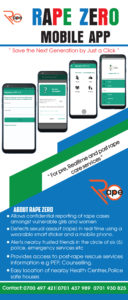 users to report rape cases, provides them with knowledge about and quick access to post-care services and links them to service providers for help. The mobile app also enables users to report a rape case using a smartphone. It provides closed group information sharing and experiences, information dissemination on the usage of post exposure prophylaxis (PEP), emergency contraceptives, condoms etc., as well as on-the-spot searches of locations of nearby health centres, pharmacies for emergency contraception services and locations of VHTs in villages for emergency guidance and longer term counselling.
users to report rape cases, provides them with knowledge about and quick access to post-care services and links them to service providers for help. The mobile app also enables users to report a rape case using a smartphone. It provides closed group information sharing and experiences, information dissemination on the usage of post exposure prophylaxis (PEP), emergency contraceptives, condoms etc., as well as on-the-spot searches of locations of nearby health centres, pharmacies for emergency contraception services and locations of VHTs in villages for emergency guidance and longer term counselling.
Second is the web application (dashboard) which will allow service providers (aka stakeholders such as the ministries, gender-based organizations, police etc) to have access to real time rape cases data. They will be able to take action, make any analysis and follow-up required. It will also be possible to generate trends, total rape cases in various regions of the country, total rape cases per district, total rape cases per county, total rape cases per sub-county, total rape cases per parish, total rape cases per village, streets with highest rape cases, villages with highest rape cases, parishes with highest rape cases and etc. Government will then be able to identify high risk areas and provide necessary action services, including policy changes and formulation.
The third component is a smart sticker-like wearable sensor which is attached to any piece of cloth (preferably underwear). The sensor is trained to learn the difference between the actions of a person who is undressing normally and when they are being forcefully stripped. This allows the sensor to detect signs of an assault even when the victim is unconscious or not in the position to fight against the assailant, such as in cases of children or someone who is incapacitated. Through the sensor, a pre-identified group of the individual’s close and nearby family and/or friends is alerted that the individual is in trouble – and can themselves mobilise or mobilise others to help the individual in real time.
Rogers Mwavu, one of the creators of RapeZero, explained what had motivated the team to develop this app: “As lecturers we have had many students come to us to share their stories of sexual harassment and, even worse in some cases; rape. They speak about the devastating impact this has had on their ability to function normally at university – they feel isolated, left out in class and live with a deep level of resentment for self and the perpetrator. Mbarara University of Science and Technology being a community-based university we have also gotten a number of reports from members within the community complaining about sexual and gender-based violence (SGBV). Based on these reports, we were touched decided to come up with an innovation that could save the next generation by just a click. This innovation can help many people, it can help our students and others elsewhere in higher institutions of learning. And we are committed to seeing it become fully operational. Sharing this application to reach all vulnerable groups is our ultimate goal. We believe that the more people that access it, the more gender-based violence awareness and justice will be attained.”
Next steps
The web platform is close to completion and hosting. This component alone will provide vital information on services and other forms of support available to the student body. The mobile application which allows the individual to report a case by smartphone is also nearing completion and hosting. Both are scheduled for full testing. The final component of this innovation, the wearable sticker that allows for the reporting of rape cases in real time, is yet to be manufactured.
The team is seeking investors to take their app to the next level. In their words: “we believe that this innovation can be used by girls and women to confidentially report cases of sexual violence and get linked to the nearest service providers for help. The innovation will also have a pool of existing service providers include health centres, civil society organizations (CSO), judiciary, GBV safe shelters, police and district local governments. CSOs provide psychosocial support, judiciary offers legal education and mediation, referral for medical support, while the GBV. In addition, RapeZero will be a real-time report and data collection tool for SGBV (Sexual Gender-Based Violence) and feed into the National Gender-Based Violence Database (NGBVDB)”.
The team is initially looking to share the application with campuses of universities and higher institutions of learning where the statistics have shown big numbers of culprits. However, they are also looking beyond higher education to anyone who needs it.
Connecting with the Uganda Gender Alliance
Mbarara University of Science and Technology was the location of one of four gender workshops recently convened by INASP and Ugandan National Council for Science and Technology (UNCST) as part of the new Uganda Gender Alliance. The Rape-zero team see this network as a way to help share the tool more widely within the country. As Rogers Mwazu explains:
“From the recent western Uganda gender workshop held at Mbarara University of Science and Technology, we noted that the gender alliance has the mandate to promote a research system that recognises and addresses gender barriers as well as being responsive to specific needs of both women and men in Uganda. This gives us a good basis for collaboration with the alliance. Also considering their main objectives of advocating for a gender-equitable research system, promoting networking among higher education institutions and research institutions, supporting resource mobilisation for gender-equitable research and promoting capacity building and learning among stakeholders; we believe that their role will be of much importance to have this application reach greater heights.”
For further information, please contact Rogers Mwavu – rmwavu@must.ac.ug; Richard Kimera – rkimera@must.ac.ug; or Fred Kaggwa – kaggwa_fred@must.ac.ug

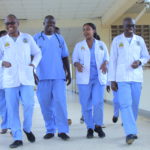 Previous Post
Previous Post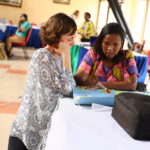 Next Post
Next Post
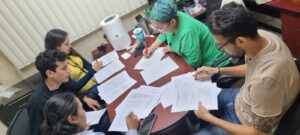


This is impressive and I think groundbreaking, is it also able to provide SRHR as well?